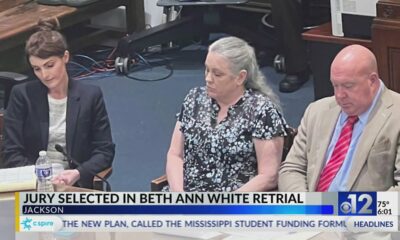Mississippi Today
For the eighth time, U.S. Supreme Court delays hearing state's felony suffrage case

For the eighth time, U.S. Supreme Court delays hearing state's felony suffrage case
The United States Supreme Court has postponed for the eighth time this year a decision on whether to hear a case challenging the constitutionality of a Mississippi provision enacted in 1890 with the intent of preventing African Americans from voting.
The case is an appeal of a decision last year by the U.S. 5th Circuit Court of Appeals upholding a provision imposing a lifetime ban on voting for many people convicted of felonies. The lifetime ban was imposed on certain crimes that the framers of the 1890 Mississippi Constitution believed at the time Black people were more likely to commit, the 5th Circuit conceded in upholding the provision.
It is not known what the eight postponements in deciding whether to hear the case might mean.
“The Supreme Court takes about one of every hundred cases it's asked to take,” said Rob McDuff, director of the Impact Litigation Project at the Mississippi Center for Justice, and part of the group asking the nation's high court to hear the case. “But the troubling racial history of this provision makes it a more likely candidate for review than most of the other cases. I assume the repeated postponements mean the justices are considering this one very carefully. We will see.”
The Supreme Court justices are scheduled to meet in conference on Friday to decide if they will take up any of the cases currently pending. Before this latest postponement, the Mississippi case was supposed to be among those cases discussed during the Friday conference.
The Mississippi felony suffrage case had been on the schedule to be taken up at seven past conferences of the Supreme Court this year. In each of those instances, like this week, the justices opted to postpone a decision on the case.
Four of the nine judges must agree to take up a case on appeal in order for the high court to hear it. According to the U.S. Courts webpage, “the Court accepts 100-150 of the more than 7,000 cases that it is asked to review each year.”
The Mississippi Center for Justice and others filed the lawsuit currently pending before the Supreme Court on behalf of Mississippians who lost their voting rights after being convicted of felonies. Mississippi is among a handful of states — less than 10 — where people do not regain their voting rights at some point after completing their sentence.
Those challenging the lawsuit say the 1890 provision is unconstitutional because it was enacted for a discriminatory purpose, thus having a “racial taint.” State Attorney General Lynn Fitch argued the “racial taint” had been removed because of action in more recent times, and a majority of the 5th Circuit agreed.
In 1950 the Legislature passed a proposal approved by voters to remove burglary as one of the disfranchising crimes. And in the 1960s, the Legislature and ultimately the voters approved a provision making murder and rape disenfranchising crimes.
Those changes, the majority found, removed the “racial taint” from the original 1890 language. But McDuff pointed out that those changes were made during an era of intense racial conflict and discrimination in the state. Perhaps, more importantly, the changes did not allow Mississippians to vote on whether to remove lifetime bans from voting on people convicted of other felonies.
Or as Court of Appeals Judge James Graves wrote in his dissent, “Mississippians have simply not been given the chance to right the wrongs of its racist origins. And this court … deprives Mississippians of this opportunity by upholding an unconstitutional law enacted for the purpose of discriminating against Black Mississippians on the basis of race.”
Fitch's office also argued that state commissions pondered changing the felony suffrage provision in the 1980s and opted not to do so, thus removing the racial taint.
Those crimes placed in the constitution where conviction costs a person the right to vote are bribery, theft, arson, obtaining money or goods under false pretense, perjury, forgery, embezzlement, bigamy and burglary.
Under the original language of the constitution, a person could be convicted of cattle rustling and lose the right to vote, but those convicted of murder or rape would still be able to vote — even while incarcerated.
In Mississippi, most people with felony convictions who lose their voting rights must petition the Legislature to get a bill passed by a two-thirds majority of both chambers to regain voting rights. Normally only a handful (less than five each year and none in 2023) of such bills are successful each session. There is also the option of the governor granting a pardon to restore voting rights, but no governor has granted pardons since Haley Barbour in 2012.
Editor's note: The Mississippi Center For Justice President and CEO Vangela Wade serves on Mississippi Today's board of trustees.
This article first appeared on Mississippi Today and is republished here under a Creative Commons license.
Mississippi Today
Law enforcement officers’ oversight bill heads to governor’s desk
The Mississippi Senate passed legislation Monday to give the state's officer certification board the power to investigate law enforcement misconduct.
House Bill 691, the revised version of which passed the House Saturday, is now headed to the desk of Gov. Tate Reeves.
The bill comes in the wake of an investigation by the Mississippi Center for Investigative Reporting at Mississippi Today and The New York Times into sheriffs and deputies across the state over allegations of sexual abuse, torture and corruption. The reporting also revealed how a “Goon Squad” of officers operated for two decades in Rankin County.
Public Safety Commissioner Sean Tindell said if the governor signs the bill, he anticipates the Mississippi Board on Law Enforcement Officer Standards and Training would hire a few investigators to investigate matters and make recommendations.
The bill would enable the board to establish a hearing panel on any law enforcement officer “for whom the board believes there is a basis for reprimand, suspension, cancellation of, or recalling the certification of a law enforcement officer. The hearing panel shall provide its written findings and recommendations to the board.”
In addition, deputies, sheriffs and state law enforcement would join police officers in the requirement to have 20 hours of training each year. Those who fail to get such training could lose their certifications.
Other changes would take place as well. Each year, the licensing board would have to report on its activities to the Legislature and the governor.
The bill calls for a 13-member board with the governor having six appointments – two police chiefs, two sheriffs, a district attorney and the head of the law enforcement training academy.
Other members include the attorney general, the public safety commissioner, the head of the Highway Patrol, and the presidents of the police chiefs association, the constable association, the Mississippi Campus Law Enforcement Association and the sheriff's association (or designee).
This article first appeared on Mississippi Today and is republished here under a Creative Commons license.
Mississippi Today
Legislators extend 2024 session after missing budget deadline
Legislative leaders are optimistic that they will be able to start passing bills to fund the $7-billion budget to fund state services on Tuesday.
“We will be rolling Tuesday and the day after I suppose,” said Senate Appropriations Chair Briggs Hopson, R-Vicksburg.
Late Monday the House and Senate agreed on a resolution to extend the session. Appropriations and revenue (taxes and borrowing) bills died Saturday night when House and Senate leaders could not reach agreement on a key deadline. The resolution approved Monday was needed to revive the bills.
The final day of the session was scheduled for Sunday, May 5. Now it is scheduled for May 14, but House Speaker Jason White, R-West, predicted Monday that the Legislature will finish its work this week, though leaders did concede there were still some “minor” disagreements between the House and Senate.
Under the resolution, the legislators – even though their work would be completed this week — will return on May 14 unless White and Lt. Gov. Delbert Hosemann agree not to return.
Returning on May 14 would give the Legislature the opportunity address any possible vetoes by Gov. Tate Reeves. Lawmakers can override gubernatorial vetoes with a two-thirds vote of each chamber.
Asked Monday if an agreement had been reached on the revenue bills, Senate Finance Chairman Josh Harkins, R-Brandon, who handles those proposals, said, “Gosh, I hope so. If not I am going holler a Jerry Clower for them to shoot up amongst us,” Harkins said referencing a skit by the Mississippi comic.
It took a two-thirds vote of both chambers to pass the resolution to extend the session. It passed unanimously in the House, but six members of the 52-member Senate voted no. Without the resolution, it most likely would require a special session called by Gov. Tate Reeves to pass budget bills and revenue bills.
This article first appeared on Mississippi Today and is republished here under a Creative Commons license.
Mississippi Today
Lawsuit in death of man following Jackson police encounter may be headed to trial
The family of George Robinson plans to move forward with a wrongful death lawsuit against the city of Jackson and three former police officers after rejecting a nearly $18,000 settlement offer.
Attorney Dennis Sweet III made the intentions of Bettersten Wade, Robinson's sister, and Vernice Robinson, Robinson's mother, clear in a Thursday letter sent the day after the City Council approved a $17,786 payment to settle the family's 2019 lawsuit.
“This is more than anyone should have to endure. Much less have the City of Jackson tout the purported term of settlement as some sort of victory,” Sweet wrote in the letter. “Needless to say, no individual or party obtained a victory in this matter.”
The financial terms of the settlement and plaintiffs' identities were not supposed to be disclosed publicly and the council did not approve the settlement in executive session, Sweet said. According to Mississippi's open meeting law, any public body can enter executive session for a number of reasons, including for negotiations relating to litigation.
Sweet was not immediately available to comment Monday. Last week, he told WLBT he would take it to trial.
Council President Aaron Banks, who was also not immediately available for comment, said the settlement was freely negotiated among the parties and signed by Wade and Vernice Robinson, who had their attorneys with them, according to a Friday statement to the Clarion Ledger.
Banks disputed Sweet's claims that the city violated any terms of the settlement, such as a confidentiality agreement, saying the city didn't agree to one and that settlements are public records, according to the statement.
“The City intends to honor the agreement it reached and expects the Wade family to do so, also,” Banks said in the statement.
However, some city council members said after the meeting that they were not aware of a confidentiality agreement.
City Attorney Drew Martin declined to comment Monday.
All the parties met for mediation April 12. Sweet said that during the session, a representative from the city said it is in “financial straits and did not possess substantial funds in which to resolve Ms. Wade's claims against it.” The lawsuit complaint asked for a jury trial and damages to be determined by a jury.
Banks's statement did not address the attorney's claim about the city's finances.
Wade agreed during mediation to settle with ambulance provider American Medical Response and to allow the city to join that settlement and end litigation, according to Sweet's letter.
“Had AMR not agreed to a substantial settlement amount, Ms. Wade would not have settled with the City of Jackson,” he wrote in the letter.
The company settled for a different amount that was not disclosed, according to Sweet's letter.
As of Monday, electronic court filings for the lawsuit do not show that the judge has signed off on a settlement.
In January 2019, 62-year-old Robinson was pulled from a car and beaten by officers, leaving him with severe injuries. At the time, he was recovering from a stroke. Robinson died days later.
In 2022, former detective Anthony Fox was convicted culpable-negligence manslaughter for Robinson's death, while charges against officers Desmond Barney and Lincoln Lampley were dismissed a year earlier.
Fox was incarcerated until January when the Mississippi Supreme Court overturned his conviction and issued an acquittal, freeing him. Fox has returned to work for the Canton Police Department.
This isn't Wade's only loss and fraught experience with the city, Sweet said.
Last year, her son Dexter died after being hit by a car driven by an off-duty Jackson police officer. He was buried unidentified in the Hinds County pauper's field, despite having identification on him. His family did not know he was there until months later.
This article first appeared on Mississippi Today and is republished here under a Creative Commons license.
-
Local News4 days ago
Sister of Mississippi man who died after police pulled him from car rejects lawsuit settlement
-
Mississippi Today4 days ago
At Lake High School in Scott County, the Un-Team will never be forgotten
-
Mississippi Today2 days ago
On this day in 1951
-
Mississippi News3 days ago
One injured in Mississippi officer-involved shooting after chase
-
Mississippi News6 days ago
Viewers make allegations against Hatley teacher, school district releases statement – Home – WCBI TV
-
Mississippi News Video5 days ago
Vehicle struck and killed man lying in the road, Alcorn County sheriff says
-
Mississippi News4 days ago
Ridgeland man sentenced for molesting girl
-
Mississippi News5 days ago
Suspected Dollar General armed robber arrested in Pickens County


































